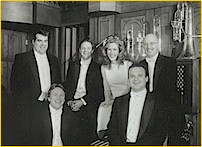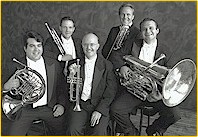|
|
|
 |
|
|
|
|
|
Competitions
|
|
|
|

Boston
Brass with
Christina Fischer, organist |
|
Starting
in 1988 and continuing through 1992, Boston
Brass took part in five music competitions.
Three were restricted to brass quintets
only, and the other two were open to a variety
of instrumental combinations.
Of these two, one included a marimba
ensemble -- they were very good! -- and for the
other one, we were given just one week's notice
to participate. At that particular competition, we were competing with a
string quartet.
|
|
|
|
|
| Taking
part in every one of these events provided an excellent
growing opportunity for the quintet.
The commitment to prepare a variety of styles
allowed us to learn much about ensemble sound, leading
and following within a group of five.
There were several coachings from seasoned
professionals in the Boston area that also added to our
growth. |
|
|
|
|
The
first two of the brass quintet competitions were held in
Baltimore, Maryland, hosted by the Annapolis Brass
Quintet. This was run as a festival over a few days and
included a guest ensemble.
During the course of the festival, there were
various concerts mixed in with the rounds of the
competitions. The playing was quite good and the audiences
were used to this event -- they enjoyed all of it
enthusiastically.
|
|
|
|
|
That
first year at the Baltimore competition, 1988, a quintet
from France won the first prize, the Atlantic Brass
Quintet from Boston won second, our group took third.
We worked hard and were given the highest marks for
the music we liked the least! It was some contemporary music written for this competition,
and it seemed to be deliberately written in as unnatural
and awkward a manner as possible.
This kind of music always seemed the hardest to
make sound worth listening to.
|
|
|
|
| In
1989 the quintet went again to Baltimore.
We felt better about our chances, doing our best
to convey the depth of our music. This
time, when the Atlantic Brass Quintet captured the first
prize, our quintet began to identify them as our main
competitors. This
is strictly a mental attitude, as the "real
competition" is out in the world, that of creating
a individual voice.
After a while we realized this. |
|
|
|
| At
every competition we always made our best effort, and
though the first prize seemed to elude us, it was
actually our efforts that guided and aided our growth,
more so than a particular prize.
That's not to say that First Prize wouldn't have
tasted quite sweet! |
|
|
|
| NARBONNE
1992
|
|
|
|
| During
this stage we toyed with the idea of the
prestigious Naumberg competition. It seemed like
the grandest of all chamber competitions.
Then we learned of the Narbonne
International Brass Quintet Competition from a
judge (a French horn player who had been there)
at one of the mixed-instrument ensemble
competitions we went to. |
 |
|
|
|
|
| The
decision was soon made that we would go to the 1992
Narbonne competition.
Raising money was difficult.
Many parents and family members more than went
the "extra mile" to make our trip to France,
from start to finish, as smooth as possible. |
|
|
|
| This
kind of support made it possible for us to go at all.
|
|
|
|
| At
Narbonne there were 15 ensembles that had come from
England, Russia, Amsterdam, France, United States (the
Galliard Brass from Ann Arbor, Michigan, and Boston
Brass and Atlantic Brass Quintet, from Boston,
Massachusetts), Canada, Japan, and other places I cannot
recall. The
first round had three pieces of music.
One of these was required by everyone, written
for the competition, and the other were chosen from an
"either 'A' or 'B'" kind of choice, with both
'A' and 'B' being provided by the rules of the
competition.
|
|
|
|
| Arriving
at Round Two, we were one of 10 quintets left, five
having been eliminated in Round One.
The selections for this round were determined in
a similar choosing manner as in the First Round.
We later learned that at the end of Round Two, we
were viewed as being "in the lead" by the
judges. But
there was one more round to go. |
|
|
|
| The
Final Round reduced the number to five groups.
The music for this round consisted of four
selections. Three
of these were required by each group: the "Toccata
and Fugue in D Minor" by J.S. Bach (arranged by
Fred Mills), the "Adagio" by Samuel Barber
(also a Canadian Brass arrangement), and "Handful
of Keys" by Fats Waller (again a Canadian Brass
arrangement, this one by Luther Henderson).
The fourth selection was to be a work of each
quintet's choosing. |
|
|
|
| Boston
Brass chose for their work of choice a delightful
multi-movement work by Jan Koetsier called "Kindezirkus".
During this final round each quintet was to
introduce their final work to the panel of judges.
As the judges might not know these chosen works,
it was part of the presentation to have them announced
from the stage. |
|
|
|
| When
our turn came, I stood before we played, announcing that
our work of choice was to be the 9-movement "Kinderzirkus"
of Jan Koetsier. Later
we were having a lunch with the judges, one of whom was
Roger Bobo, the internationally acclaimed tuba soloist.
In talking with him, he said that when I
announced that our work of choice consisted of nine
movements, all he could think was, "NINE
MOVEMENTS?!! OH
NO!" We
had a good laugh over that. On
future performances I would mention that several of
these movements were very brief.
|
|
|
|
| The
work of choice by the Atlantic Brass Quintet was their
arrangement of Gershwin's "American In Paris".
I did not hear it, but others in the quintet who
did say that it really did sew up the first prize for
them. While
taking Third Prize seemed a little tough in that moment
of truth, it was, after all, still Third Prize, and we
earned every bit of it!
The group who won Second Prize (I am embarrassed
to admit that I've temporarily forgotten which group it
was) played for their work of choice their arrangement
of the Overture to "Nabucco" of Verdi -- it
was stunning!
|
|
|
|
| Competitions
are inherently subjective, more so than they are
objective. Even
so, it is possible to maintain a high standard of
playing for purposes of a baseline. With such legendary groups as the American Brass Quintet,
Empire Brass, Canadian Brass, New York Brass Quintet,
and others, standards of precision are well in place.
The part that is subjective lies in the personal
tastes and quirks of the judges who cannot help but be
biased to some degree along those lines of taste and
individuality.
|
|
|
|
| As
the panels of judges are constantly shifting, so does
its mix of personalities.
Another "X" factor at all competitions
is the ensembles themselves that come to participate.
The number, level and general nature of these
ensembles can never be known ahead of time, and they
certainly add to the total experience of any
competition. |
|
|
|
| I
heard that at the next Narbonne competition, in 1994,
there were seven quintets participating. You just never know what will be in the mix of any
competition, so the best thing to do is to prepare to do
the best you can do.
They are certainly worth the effort. |
|
|
|
|